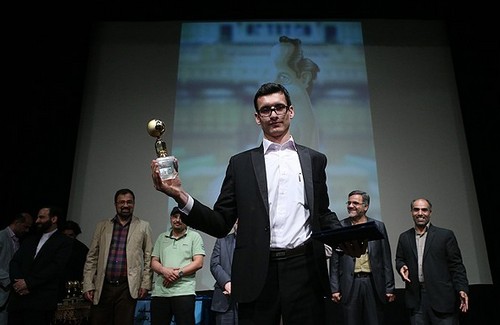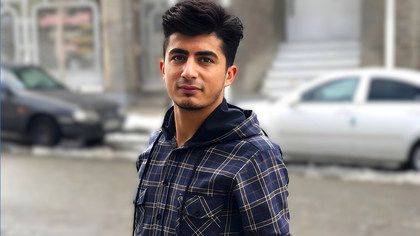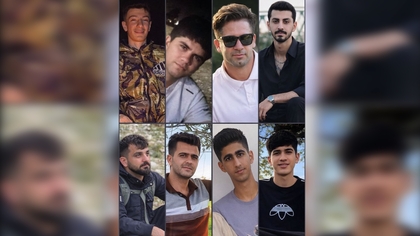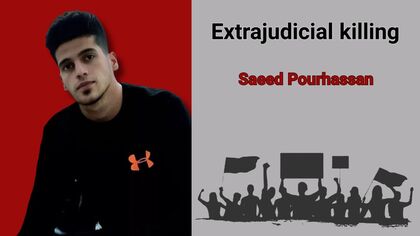Kurdish Cartoonist Wins the Hypocritical Anti-ISIS Cartoon Competition in Iran
02:38 - 13 June 2015

Kurdpa: Kurdish Cartoonist Aref Niazi, from Kermashan (Kermanshah in Persian), was declared the winner of the hypocritical anti—ISIS cartoon competition, sponsored by the Islamic government in Iran.
Iran\'s House of Cartoons launched another cartoon competition, mocking the militant ISIS group and its leaders.
The organizers had invited submissions from around the world. The Kurdish Cartoonist Aref Niazi, from Kermashan, was declared the winner of this anti—ISIS cartoon competition, among the thousands of submissions.
“No doubt, Aref Niazi is a talented artist and a professional member of the Kermashan House of Caricature; however, I speculate the timing of a Kurd winning the award. Kurds in Iraq are battling the ISIS terror group, and majority of Kurds are Sunni Muslims,” said Taha Hassaniani, a journalist familiar with Iran and the region, in an interview with Kurdpa.
“The Islamic Regime in Iran is a Shia state, and they only differ with ISIS in ideology; otherwise, they are practically the same in nature. The Iranian regime is no less brutal and terrorist than ISIS. It seems Iran may want to enflame the Shia-Sunni war further and rally the Sunni Kurds behind its anti-Sunni cause, cloaked in anti-ISIS cover”, he further added.
Even though the competition was to “to reveal the true nature of ISIS”, as declared by the organizers and as the title of the competition advertises, the main objective seems to have been to mock Western and Arab countries and leaders who are not on good term with the clerical regime.
Of course, the state of Israel and its leaders are in Iran’s top target list when it comes to this sort of ridiculing.
“While the arrogant government with their unwavering support could bring such savaged group to the Islamic world to kill and murder many innocent Muslims and on the other hand in order to deceive world opinion chants the slogan against this group of mercenaries, any kind of help is worthy to uncover them. And in every possible way reveal the evil face of their supporters (Western- Hebrew-Arabs)”, read the announcement on the organizer’s website.
The Cartoon Section theme was ISIS or Daesh (an acronym commonly used in the region to refer to the terror group); however, the Caricature Section theme was much broader to include, ISIS leader Abu Bakr Al Baghdadi, Benjamin Netanyahu of Israel, France’s François Hollande, UK’s David Cameron and US President, Barack Obama.
Some of the cartoons submitted as part of the contest, for example, depict ISIS as a puppet whose strings are pulled by none other than the United States and Israel.
Funded by the government in Tehran, the House of Cartoon last held a competition on the theme of Holocaust denial following the depiction of the Prophet Mohamed in the French magazine Charlie Hebdo earlier this year.
On one hand, the clerical rulers of Iran call for the death of those who mock their sacred religious beliefs and leaders through satire; on the other hand, they proudly hold contests to draw criticism of their foes. Iranian leaders also overwhelmingly condoned the Islamist attack on the Satire Magazine Charlie Hebdo.
In Iran, cartoonists who mock Iranian politicians can face harsh punishments. An artist and political activist, Atena Farghadani, was sentenced to more than 12 years in prison for drawing a cartoon disparaging members of parliament over their decision to restrict birth control for women.
In 2012, another cartoonist, Mahmoud Shokraye, was sentenced to 25 lashes for a caricature of a local MP.
Earlier in May, a report by the Committee to Protect Journalists (CPJ) revealed that cartoonists in Iran often face considerable threats and retaliation in response to their work.
Courtney Radsch, Advocacy Director of CPJ, told Newsweek that cartoonists are \"particularly vulnerable\" to threats because their work conveys \"incredibly complex ideas and themes and critiques in a pretty simple, easy to understand manner that crosses barriers\".
According to CNN, Iran is listed by the Committee to Protect Journalists as one of the 10 most censored countries and one of the 10 biggest jailers of journalists worldwide.
Writing by Kurdpa Staff Writers and editing by Sharmin Hassaniani
Iran\'s House of Cartoons launched another cartoon competition, mocking the militant ISIS group and its leaders.
The organizers had invited submissions from around the world. The Kurdish Cartoonist Aref Niazi, from Kermashan, was declared the winner of this anti—ISIS cartoon competition, among the thousands of submissions.
“No doubt, Aref Niazi is a talented artist and a professional member of the Kermashan House of Caricature; however, I speculate the timing of a Kurd winning the award. Kurds in Iraq are battling the ISIS terror group, and majority of Kurds are Sunni Muslims,” said Taha Hassaniani, a journalist familiar with Iran and the region, in an interview with Kurdpa.
“The Islamic Regime in Iran is a Shia state, and they only differ with ISIS in ideology; otherwise, they are practically the same in nature. The Iranian regime is no less brutal and terrorist than ISIS. It seems Iran may want to enflame the Shia-Sunni war further and rally the Sunni Kurds behind its anti-Sunni cause, cloaked in anti-ISIS cover”, he further added.
Even though the competition was to “to reveal the true nature of ISIS”, as declared by the organizers and as the title of the competition advertises, the main objective seems to have been to mock Western and Arab countries and leaders who are not on good term with the clerical regime.
Of course, the state of Israel and its leaders are in Iran’s top target list when it comes to this sort of ridiculing.
“While the arrogant government with their unwavering support could bring such savaged group to the Islamic world to kill and murder many innocent Muslims and on the other hand in order to deceive world opinion chants the slogan against this group of mercenaries, any kind of help is worthy to uncover them. And in every possible way reveal the evil face of their supporters (Western- Hebrew-Arabs)”, read the announcement on the organizer’s website.
The Cartoon Section theme was ISIS or Daesh (an acronym commonly used in the region to refer to the terror group); however, the Caricature Section theme was much broader to include, ISIS leader Abu Bakr Al Baghdadi, Benjamin Netanyahu of Israel, France’s François Hollande, UK’s David Cameron and US President, Barack Obama.
Some of the cartoons submitted as part of the contest, for example, depict ISIS as a puppet whose strings are pulled by none other than the United States and Israel.
Funded by the government in Tehran, the House of Cartoon last held a competition on the theme of Holocaust denial following the depiction of the Prophet Mohamed in the French magazine Charlie Hebdo earlier this year.
On one hand, the clerical rulers of Iran call for the death of those who mock their sacred religious beliefs and leaders through satire; on the other hand, they proudly hold contests to draw criticism of their foes. Iranian leaders also overwhelmingly condoned the Islamist attack on the Satire Magazine Charlie Hebdo.
In Iran, cartoonists who mock Iranian politicians can face harsh punishments. An artist and political activist, Atena Farghadani, was sentenced to more than 12 years in prison for drawing a cartoon disparaging members of parliament over their decision to restrict birth control for women.
In 2012, another cartoonist, Mahmoud Shokraye, was sentenced to 25 lashes for a caricature of a local MP.
Earlier in May, a report by the Committee to Protect Journalists (CPJ) revealed that cartoonists in Iran often face considerable threats and retaliation in response to their work.
Courtney Radsch, Advocacy Director of CPJ, told Newsweek that cartoonists are \"particularly vulnerable\" to threats because their work conveys \"incredibly complex ideas and themes and critiques in a pretty simple, easy to understand manner that crosses barriers\".
According to CNN, Iran is listed by the Committee to Protect Journalists as one of the 10 most censored countries and one of the 10 biggest jailers of journalists worldwide.
Writing by Kurdpa Staff Writers and editing by Sharmin Hassaniani



